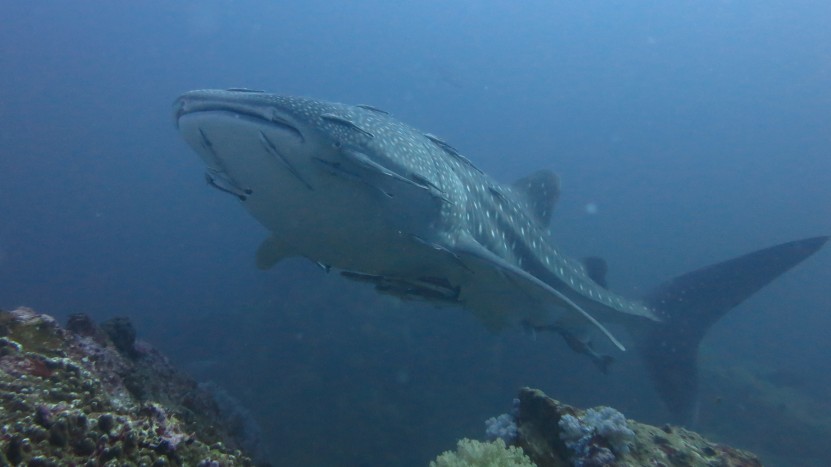Wonderful Whale Sharks

As regular readers of our blog will know, this year Blue Guru is 1 of 6 organisations worldwide to be running an Ocean Action Project sponsored by Project AWARE, the international marine conservation charity.
Whilst our Ocean Action Project has a local scope, we also contribute to national & international research by sharing our data with other conservation entitities. As our dive centre is now closed for monsoon season, over the next few months our blogs will explain more about international research supported by our Ocean Action Project. Firstly, let's focus on wonderful whale sharks ...
During last season's Ocean Action Project research, Blue Guru recorded 17 whale shark sightings. These were predominantly at Richelieu Rock but also at Surin Islands, Koh Bon & our new offshore wreck, HTMS Phra Thong. Every encounter was absolutely awesome!
Whale sharks are the species most of our divers & snorkelers want to see more than anything else. Their widespread popularity means their value to national GDP as an eco-tourism attraction is far greater than the relatively low amount paid to the fishing industry for their meat & fins. As a vulnerable species listed on CITES Appendix II, international trade in whale sharks is restricted - they can only be exported under licence if legally caught from sustainable stocks. But is this regulation enough to protect them from over-fishing? It certainly does not protect them from accidently becoming by-catch in trawlers' nets or sustaining life-threatening injuries by colliding with fishing boats.
Whale sharks are migratory fish traversing across oceans & seas with relativley little known about their migration patterns, so international conservation efforts are difficult. It is important to know where whale sharks travel throughout the year and where they may go to reproduce. Then if they are moving into potentially dangerous waters at threat from fishing boats, additional measures can be implemented, e.g. extended Marine Protection Areas & no-fishing zones.
Tagging whale sharks to track their movements is challenging & expensive and the tags only stay on for a limited time. This is why "citizen science" is so valuable to international research about whale sharks. "Citizen science" is when data is submitted by the general public to support research projects. The more people that contribute, the greater the learning. All divers & snorkelers can participate in whale shark research. Here's how ...
Whale sharks have unique markings around their gills & dorsal fin which can be used to identify individuals, just like fingerprints for humans. Technology originally developed by NASA to analyse stars in the sky can also distinguish between whale sharks' patterns of spots & stripes. By submitting key data on all whale shark sightings, along with photos of gills & dorsal fins on both sides, a better picture can be developed of whale sharks' migration patterns around the world.
There are 2 main conservation agencies managing global photo identification databases: Ecocean (www.whaleshark.org) and Shark Trust (www.sharktrust.org).
Data & photos can be submitted to both databases retrospectively, so we encourage all divers to look back in their log books & photo albums and make as many submissions as they can for previous whale shark sightings. For all future dives with whale sharks, remember to note key data required, e.g.:
- Date, time & location of sighting
- Whale shark's length, gender, behaviour & any markings/tags.
Also try to take photos of gills & dorsal fins from both left & right sides.
Whilst photos are important to research, please ALWAYS be an eco-diver:
- Keep safe distances: at least 3m from whale shark's head/body & 4m from tail;
- Do not obstruct a whale shark's movement by swimming in front of it;
- No flash photography.
By submitting all Blue Guru's whale shark data & photos to Ecocean & Shark Trust we know that out of our 17 sightings last season, only 2 were the same whale shark. 1 whale shark was seen in Surin Islands, then again 4 days later at Richelieu Rock. This means we saw 16 different whale sharks migrating through our area of the North Andaman Sea, most of which were juveniles. None of these whale sharks had ever been reported to Ecocean or Shark Trust before. Whilst this is exciting enough in itself, we also eagerly await updates on where "our" whale sharks may be reported next ... maybe Maldives, Mozambique, Mexico???
If you are interested in learning more about whale shark's biology, distribution & behaviours; the threats they face & how you can support conservation; and how to passively interact with the world's largest fish, then consider doing the PADI Whale Shark specialty course.
Next blog we'll look at majestic manta rays ...



